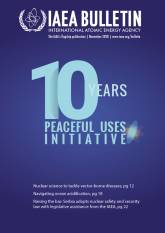
If you would like to learn more about the IAEA’s work, sign up for our weekly updates containing our most important news, multimedia and more.
Raising the Bar
Serbia adopts nuclear safety and security law with legislative assistance from the IAEA
Joanne Liou

Serbia’s Hangar H3 accepts low and intermediate radioactive waste. It has been in operation since 2012. (Photo: Public Company Nuclear Facilities of Serbia)
Raising the bar: Serbia adopts nuclear safety and security law with legislative assistance from the IAEA
To ensure the safe, secure and peaceful use of nuclear technology in any country, whether in the medical, agricultural or industrial fields, an effective and comprehensive national legal framework is critical. In line with its mandate, the IAEA provides legislative assistance, upon request, to help countries to create, implement and maintain this framework.
With support from the IAEA’s technical cooperation programme and the Peaceful Uses Initiative, the IAEA’s legislative assistance programme prepares needs assessments, provides training courses and workshops, develops reference material and offers strategic advice and assistance in drafting and reviewing national nuclear legislation. More than 100 countries have benefited from this assistance.
“ We have managed to get significant clarifications of issues when developing our new nuclear law.
Establishing nuclear safety and security in Serbia
Since Serbia became an IAEA Member State in 2001, representatives from the country have participated in regional workshops hosted by the IAEA as a part of its legislative assistance programme, including the IAEA Nuclear Law Institute (NLI). In the last 10 years, around 600 officials from around the world have participated in the NLI, which is an annual two-week training course focused on legislative drafting.
“Through our representatives’ regular participation in the NLI and bilateral meetings with the IAEA, we have managed to get significant clarifications of issues when developing our new nuclear law,” said Branko Brajic, Assistant Director at the Serbian Radiation and Nuclear Safety and Security Directorate.
IAEA legal staff and experts contributed to the drafting of Serbia’s recent nuclear safety and security law. “We assisted the country through the review of its draft Law on Radiation and Nuclear Safety and Security with the aim of ensuring the law’s alignment with relevant international legal instruments, standards and guidance,” said Wolfram Tonhauser, Head of the IAEA’s Nuclear and Treaty Law Section. “The new law, which was adopted in February 2019, establishes the Serbian Radiation and Nuclear Safety and Security Directorate as an independent regulatory body.” The Directorate assumed all regulatory duties in radiation and nuclear safety and security, including inspection oversight and decommissioning.
The law aims to protect the public and the environment from the effects of ionizing radiation. It regulates the use of radiation sources and the response to radiation exposure in planned, existing and emergency situations. “This law is an example of comprehensive legislation in this field, especially when it comes to countries that, like Serbia, do not have nuclear power programmes,” Brajic said. “In the future, Serbian representatives, with help from the IAEA, will continuously work on upgrading statutory provisions in line with technical and technological advances.”
Enhancing nuclear legal frameworks in Europe and Central Asia
The IAEA is implementing a regional legislative assistance project with countries across Eastern Europe and Central Asia. Its goal is to help governments to create, implement and maintain comprehensive national nuclear legal frameworks and become party to the relevant international legal instruments. “The available legislative assistance will enable all participating countries to assess, revise and draft national legislation,” said Brajic, who serves as the lead coordinator of the regional project. “Many countries have already submitted their informal work plans identifying assistance in support of their efforts to strengthen their legal framework.” The project will enhance understanding and capabilities through training in nuclear law, while raising decision makers’ awareness of the benefits of international legal instruments and comprehensive national legal frameworks.
In the first of a series of events under this initiative, the IAEA organized a regional workshop on harmonizing national nuclear law with international and European law, hosted by the University of National and World Economy in Sofia, Bulgaria, in January 2020. “This workshop, as well as all intended activities within this project, is expected to lead to better addressing all relevant topics and common challenges concerning the national nuclear legal framework and enhanced collaboration between more experienced and less experienced countries,” Brajic said. More than 50 participants attended the workshop, which covered all branches of nuclear law: safety, security, safeguards and civil liability for nuclear damage.
However, owing to the COVID-19 pandemic, several activities had to be postponed. As an interim measure, virtual activities are taking place.
“The launch of our Webinar Series on Nuclear Law on 5 October marks a new approach, during this current period of international travel disruptions, to engaging with our Member States in this area,” Tonhauser said. Around 480 officials participated in the first webinar, which covered the role of the IAEA.
“Due to interest in the series, we will host a webinar on nuclear law for the general public as well. It will provide an opportunity for individuals and organizations, including from industry, law firms, non-governmental organizations, civil society and academia, to engage with IAEA staff and international experts on the subject,” Tonhauser added.




